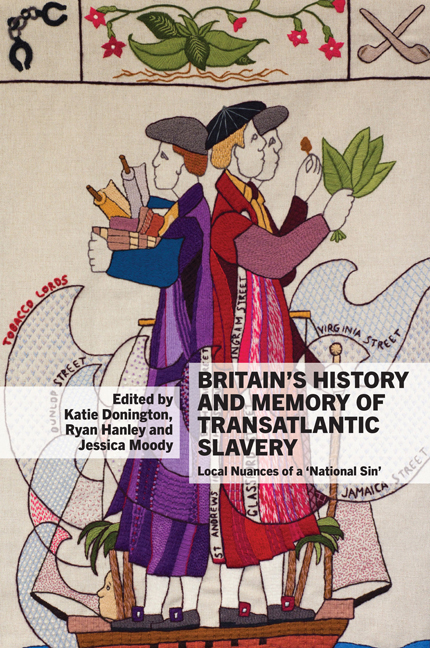Book contents
- Frontmatter
- Contents
- List of Illustrations
- Acknowledgements
- Contributors
- Introduction
- I Little Britain's History of Slavery
- II Little Britain's Memory of Slavery
- 6 Whose Memories? Edward Long and the Work of Re-Remembering
- 7 Liverpool's Local Tints: Drowning Memory and ‘Maritimising’ Slavery in a Seaport City
- 8 Local Roots/Global Routes: Slavery, Memory and Identity in Hackney
- 9 Multidirectional Memory, Many-Headed Hydras and Glasgow
- 10 Making Museum Narratives of Slavery and Anti-Slavery in Olney
- Afterword
- Selected Bibliography
- Index
- Plate section
8 - Local Roots/Global Routes: Slavery, Memory and Identity in Hackney
from II - Little Britain's Memory of Slavery
- Frontmatter
- Contents
- List of Illustrations
- Acknowledgements
- Contributors
- Introduction
- I Little Britain's History of Slavery
- II Little Britain's Memory of Slavery
- 6 Whose Memories? Edward Long and the Work of Re-Remembering
- 7 Liverpool's Local Tints: Drowning Memory and ‘Maritimising’ Slavery in a Seaport City
- 8 Local Roots/Global Routes: Slavery, Memory and Identity in Hackney
- 9 Multidirectional Memory, Many-Headed Hydras and Glasgow
- 10 Making Museum Narratives of Slavery and Anti-Slavery in Olney
- Afterword
- Selected Bibliography
- Index
- Plate section
Summary
Face to face with a culture, an economy and a set of histories which seem to be written or inscribed elsewhere, and which are so immense, transmitted from one continent to another with such extraordinary speed, the subjects of the local, of the margin, can only come into representation by, as it were, recovering their own hidden histories.
Stuart Hall, ‘The Local and the Global’Introduction
The local and the global have never seemed more connected than in the present moment. The 2007 financial crash, the war on terror and the humanitarian refugee crisis have highlighted our transnational interdependencies, exposing the limits of national sovereignty and the global relationships that structure the present. As Stuart Hall suggests, when confronted by globalisation, and the decline of the national, one possible response is a turn to the local. The comfort of recognition, the predictability of the knowable, offers a stable identity with which to cloak oneself. Local history – conceptualised as parochial, amateurish, inward-looking – would certainly seem to offer an image of familiarity, of permanence. But local areas do not operate in isolation, they were and are places that reach out and connect to different geographic locations. People, capital, goods and ideas constantly circulate, leaving traces of themselves behind. Local communities and identities are not necessarily unchanging and immutable, particularly in the context of the multiple locales that make up Britain's cities. As Michael Ignatieff writes,
we think of belonging as rootedness in a small familiar place yet home for most of us is the convulsive arteries of a great city. Our belonging is no longer to something fixed, known and familiar but to an electric and heartless creature eternally in motion.
The world's great cities are now global hubs; the 2011 census recorded that some 36.7 per cent of people living in London were born outside of Britain. Many of the communities that make up London's present multicultural population are connected to the city through links to Britain's former empire. During the eighteenth and nineteenth centuries Britain, and particularly its capital, increasingly understood itself as an imperial global power. Trade, colonisation and the ‘civilising mission’ required mobility and interconnectedness.
- Type
- Chapter
- Information
- Britain's History and Memory of Transatlantic SlaveryLocal Nuances of a 'National Sin', pp. 172 - 194Publisher: Liverpool University PressPrint publication year: 2016



